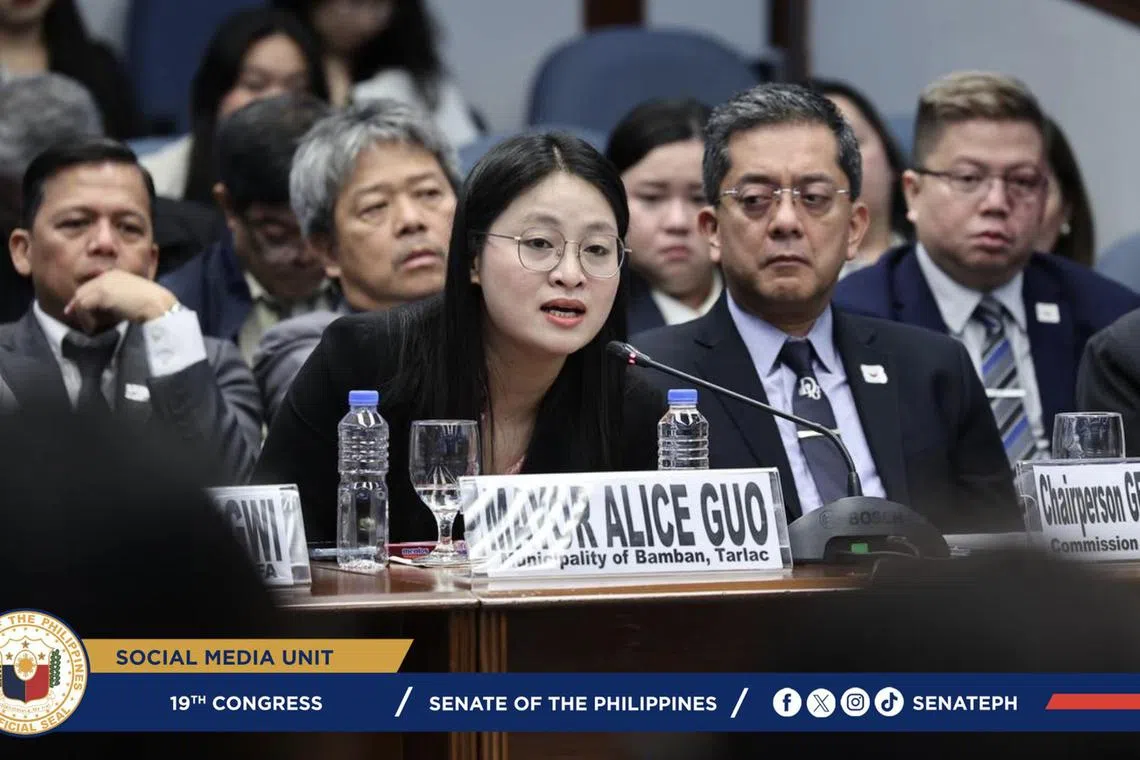Philippine Senate probes mayor’s alleged ties to Chinese crime and her citizenship
Sign up now: Get insights on Asia's fast-moving developments

The arrest threat came after the mayor, Ms Alice Guo, failed to appear for a second consecutive hearing, citing stress.
PHOTO: SENATE OF THE PHILIPPINES
Follow topic:
MANILA – The Philippine Senate threatened on July 10 to arrest a small town mayor for contempt during a hearing investigating her alleged ties with Chinese criminal syndicates, a case that has captivated the nation amid tensions between Manila and Beijing.
The arrest threat came after the mayor, Ms Alice Guo, failed to appear for a second consecutive hearing, citing stress.
The case began in March, when the authorities raided a casino in Ms Guo’s sleepy farming town of Bamban. It has shed light on criminal activity in the mostly Chinese-backed online casino industry in the Philippines.
It gained national attention after one senator questioned if Ms Guo might not have been born in the Philippines and could even be a Chinese “asset”, an accusation she denied. She has also denied links to criminals, saying she is a natural-born Philippine citizen.
Ms Guo did not respond to Reuters’ request for comment but wrote to the Senate that she was the subject of “malicious accusations”.
On July 10, the Senate cited Ms Guo for contempt over her failure to appear for the hearing and Senator Risa Hontiveros, who is leading the investigation, said she would set in motion steps to get a warrant for her arrest.
“The chair has ruled to cite them in contempt,” said Ms Hontiveros, who told a previous hearing that Ms Guo might have actually been born in China and be a Chinese “asset”, although she gave no proof.
The investigation began after a police raid revealed a scam centre
It was one of many that have sprung up across South-east Asia in recent years.
The raid uncovered hundreds of trafficked workers, including foreign nationals, spurring a human trafficking complaint against Ms Guo from an agency battling organised crime.
Ms Guo has said she sold her stake in the business before she was elected in 2022 and had no knowledge of criminality.
Officials have turned a searchlight on her background since.
The National Bureau of Investigation said Ms Guo’s fingerprints matched those of a Chinese national
The solicitor-general is seeking to cancel her birth certificate, and she has been suspended from her post during the investigation.
The Senate committee urged the immigration agency to stop Ms Guo from leaving the Philippines.
Mr Stephen David, Ms Guo’s attorney, told radio station DWPM that she had been “traumatised” by previous sessions but had assured him she was still in the Philippines.
“If she gets arrested and detained at the Senate, then she will testify,” he said.
Earlier hearings grilled Ms Guo about her background and a lack of records regarding her presence in the Philippines.
After she was unable to recall details of her childhood, Ms Hontiveros asked if she was an “asset” for China.
In May, President Ferdinand Marcos Jr told reporters: “No one knows her. We wonder where she came from.
“That’s why we are investigating this, together with the Bureau of Immigration, because of the questions about her citizenship.”
Ms Guo has denied she is a spy, saying in a TV interview that she was a simple Philippine citizen, the love child of her Chinese father with a maid and had grown up “hidden” on a pig farm and was homeschooled, with no friends.
Ms Guo’s case comes at a time of growing Philippine suspicion about China’s activities following an increasingly tense dispute over reefs and shoals in the busy waterway of the South China Sea, where both nations have claims.
It has boosted calls for a crackdown on Philippine offshore gambling operators, mostly run by Chinese nationals to serve clients in China, which flourished during the tenure of then President Rodrigo Duterte, but have since drawn scrutiny. REUTERS

